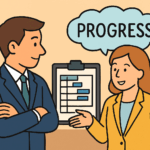皆様お疲れ様でございます。本日は英語の面接対策フレーズについて一緒に学んでいきましょう。
今後英語を使わない会社の方が少なくなっていく中で転職活動においても英語面接が実施される企業は増えていくでしょう。おそらくこの記事を見ていただいているあなたはこれから英語面接を受けることが決まっているのかもしれませんね。
長いキャリアを考えれば英語面接は避けて通れない壁のひとつになりつつあります。転職のための業務経験は十分でも、英語で自分を効果的にアピールできるか不安を感じることもあるでしょう。
本記事では、転職の場面での難易度の高い応用の質問を集めました。実践的な英語面接の質問例とその返答例を知って多少なりとも準備をしておくことで、自信を持って面接に臨むことができるます!
それでは今日も初めて行きましょう。よろしくお願いします!
- 1. Where do you see yourself in 10 years?(10年後にどのようになっていたいですか?)
- 2. What kind of compensation would you expect?(どのような報酬を期待していますか?)
- 3. Tell me about a professional failure and what you learned from it.(失敗経験とそこから学んだことを教えてください)
- 4. How would your colleagues describe you?(同僚はあなたをどんな人だと言うでしょうか?)
- 5. How do you approach risk-taking at work?(仕事におけるリスクテイクについてどう考えますか?)
- 6. How do you manage competing priorities?(優先順位が競合したときはどう対処しますか?)
- 7. Tell me about a time you had to learn something very quickly.(短期間で何かを学ばなければならなかった経験を教えてください)
- 8. How do you handle underperforming team members?(パフォーマンスが低いチームメンバーにどう対応しますか?)
- 9. Describe a time you influenced someone without authority.(権限がない中で他人を動かした経験を教えてください)
- 10. If you could improve one thing about your previous job, what would it be?(前職で改善できるとしたら何を変えますか?)
- 11. How do you keep yourself updated in your field?(業界の最新情報をどのようにキャッチアップしていますか?)
- 12. How would you handle receiving criticism from a junior colleague?(後輩から批判的な意見をもらったらどうしますか?)
- 13. If you had unlimited resources, what project would you pursue?(無制限のリソースがあったらどんなプロジェクトをしますか?)
- 14. What’s your decision-making process?(意思決定プロセスを教えてください)
- 15. How do you measure your own success?(自分自身の成功をどう定義していますか?)
- 16. How do you stay motivated during repetitive tasks?(単調な作業でもモチベーションを保つ方法は?)
- 17. Describe a situation where you had to persuade a skeptical audience.(懐疑的な相手を説得した経験を教えてください)
- 18. What would you do if you disagreed with your manager’s decision?(上司の決定に納得できなかったらどうしますか?)
- 19. If you had to automate a task from your current or previous role, what would it be?(前職または現職で自動化したい業務は?)
- 20. What do you think will be the biggest challenge in this role?(このポジションで直面する最大の課題は何だと思いますか?)
1. Where do you see yourself in 10 years?(10年後にどのようになっていたいですか?)
回答例1
“In 10 years, I aim to be in an executive leadership role, making strategic decisions that drive company growth.”
10年後には、企業成長を牽引する戦略的意思決定を担うエグゼクティブリーダーになっていたいです。
回答例2
“I hope to have expanded my expertise globally and be mentoring the next generation of leaders.”
グローバルな専門性を深め、次世代リーダーたちのメンターになっていたいです。
回答例3
“I want to have built a strong track record of innovation and operational excellence, contributing to industry leadership.”
イノベーションと業務改革で実績を積み、業界リーダーとして活躍していたいです。
ポイント解説
10年という長期視点では、リーダーシップ・業界への貢献・自己成長を必ず盛り込みましょう。
2. What kind of compensation would you expect?(どのような報酬を期待していますか?)
回答例1
“I am looking for a competitive package that reflects my skills, experience, and the responsibilities of the role.”
私のスキル、経験、そしてポジションの責任に見合った競争力のある報酬を期待しています。
回答例2
“Based on industry standards and my background, I expect a base salary of around $90,000, plus performance bonuses.”
業界水準と私の経歴を踏まえ、基本給で約9万ドル、加えて業績連動ボーナスを期待しています。
回答例3
“I’m flexible and more interested in the total value, including career growth opportunities and benefits.”
柔軟に考えており、キャリア成長機会や福利厚生も含めた総合的な価値を重視しています。
ポイント解説
金額を出す場合も「柔軟さ」「トータルパッケージ重視」という姿勢を必ず添えましょう。
3. Tell me about a professional failure and what you learned from it.(失敗経験とそこから学んだことを教えてください)
回答例1
“Early in my career, I underestimated a project’s timeline, leading to delays. I learned the importance of realistic planning.”
キャリア初期にプロジェクトの工期を甘く見積もり、遅延を招きました。リアルな計画立案の重要性を学びました。
回答例2
“I once delegated a task without clear instructions, causing confusion. Since then, I always ensure expectations are clearly communicated.”
かつてタスクを曖昧な指示で任せた結果、混乱を招きました。それ以来、指示は必ず明確にするようにしています。
回答例3
“I focused too much on technical perfection and missed a product launch deadline. I learned to balance quality with speed.”
技術的完成度にこだわりすぎて納期を守れなかった経験から、品質とスピードのバランスを学びました。
ポイント解説
失敗談では「反省だけで終わらず、成長・教訓」を強調することが絶対条件です。
4. How would your colleagues describe you?(同僚はあなたをどんな人だと言うでしょうか?)
回答例1
“They would describe me as dependable and solution-oriented.”
「頼りになり、解決志向の人」と言われると思います。
回答例2
“My colleagues often say I bring a positive energy that keeps the team motivated.”
チームに前向きなエネルギーをもたらしてくれる存在だとよく言われます。
回答例3
“I’m often described as a good listener who brings people together.”
「傾聴力があり、人をまとめるタイプ」と言われることが多いです。
ポイント解説
客観的なイメージ+チームへの良い影響をアピールできると高評価です。
5. How do you approach risk-taking at work?(仕事におけるリスクテイクについてどう考えますか?)
回答例1
“I believe in calculated risks after careful analysis and contingency planning.”
綿密な分析とリスク対策をしたうえで、計算されたリスクを取るべきだと考えています。
回答例2
“I encourage smart risk-taking when it aligns with strategic goals.”
戦略目標と一致する場合には、積極的なリスクテイクを推奨します。
回答例3
“Taking informed risks has often led me to uncover new opportunities.”
情報に基づくリスクテイクは、新たなチャンスを発見することにつながってきました。
ポイント解説
無謀なチャレンジではなく、「分析+戦略性」のあるリスクマネジメントを語ること。
6. How do you manage competing priorities?(優先順位が競合したときはどう対処しますか?)
回答例1
“I assess the impact and urgency of each task and communicate openly with stakeholders to realign expectations.”
各タスクの影響度と緊急性を評価し、関係者と率直にコミュニケーションを取って期待値を調整します。
回答例2
“I create a clear action plan and adjust timelines if necessary, ensuring critical deliverables are prioritized.”
明確なアクションプランを立て、必要に応じてスケジュール調整を行い、最も重要な成果物を優先します。
回答例3
“I involve my manager when needed to ensure my focus aligns with team goals.”
必要に応じてマネージャーにも相談し、チーム目標と優先順位の整合性を取ります。
ポイント解説
「自己判断」+「周囲と連携して調整」ができることを示すと評価されます。
7. Tell me about a time you had to learn something very quickly.(短期間で何かを学ばなければならなかった経験を教えてください)
回答例1
“When I joined my previous company, I had to learn a new CRM system within two weeks to meet client needs.”
前職で入社後2週間以内に新しいCRMシステムを習得し、クライアント対応に間に合わせました。
回答例2
“I had to rapidly learn data analysis tools to support a critical project and delivered results ahead of schedule.”
重要プロジェクト支援のためデータ分析ツールを急速に学び、予定より早く成果を出しました。
回答例3
“After being assigned to a different market, I quickly studied its regulations to successfully launch a product.”
新市場担当になった際、規制を短期間で学び、無事に製品をローンチしました。
ポイント解説
「短期間」「結果を出した」「主体的に学んだ」の3点セットで話すと効果的です。
8. How do you handle underperforming team members?(パフォーマンスが低いチームメンバーにどう対応しますか?)
回答例1
“I address issues early by offering support, setting clear goals, and following up regularly.”
早期に問題に気づき、サポートを提供し、明確な目標設定と定期フォローアップを行います。
回答例2
“I focus on understanding the root cause and providing development opportunities.”
根本原因を探り、成長の機会を与えることにフォーカスします。
回答例3
“I promote accountability while maintaining a supportive environment.”
サポート体制を保ちながら、責任意識も促進します。
ポイント解説
「指導」だけでなく「育成」のスタンスを示すとリーダーシップ評価が高まります。
9. Describe a time you influenced someone without authority.(権限がない中で他人を動かした経験を教えてください)
回答例1
“I built trust through consistent communication and showed how my proposal aligned with shared goals.”
一貫したコミュニケーションと、提案が共通目標に貢献することを示して信頼を得ました。
回答例2
“I leveraged data to build a logical case that persuaded senior stakeholders.”
データを活用してロジカルに説得し、上層部の賛同を得ました。
回答例3
“I found common interests and emphasized mutual benefits to encourage collaboration.”
共通の利害を見つけ、双方のメリットを強調して協力を引き出しました。
ポイント解説
「論理」「共感」「信頼」のどれかで相手を動かしたことを具体的に示しましょう。
10. If you could improve one thing about your previous job, what would it be?(前職で改善できるとしたら何を変えますか?)
回答例1
“I would enhance internal communication channels to improve cross-team collaboration.”
部門間連携を高めるために、社内コミュニケーションの仕組みを強化したいです。
回答例2
“I would implement more structured project management processes to increase efficiency.”
業務効率向上のため、プロジェクト管理プロセスをもっと体系化したいです。
回答例3
“I would suggest more regular feedback loops to accelerate professional development.”
社員の成長加速のため、定期的なフィードバックの仕組みを提案したいです。
ポイント解説
会社批判はNG。「ポジティブな提案」として答えるのが鉄則です。
11. How do you keep yourself updated in your field?(業界の最新情報をどのようにキャッチアップしていますか?)
回答例1
“I subscribe to industry journals and regularly attend webinars and conferences.”
業界専門誌を購読し、ウェビナーやカンファレンスにも定期参加しています。
回答例2
“I participate in professional communities and engage in peer discussions.”
専門コミュニティに参加し、同業者とのディスカッションを通じて情報交換しています。
回答例3
“I take online courses to continuously build new skills relevant to my role.”
役割に直結する新しいスキルを磨くため、オンライン講座も積極的に受講しています。
ポイント解説
「受動的に読むだけ」ではなく「能動的に学ぶ」スタンスをアピールしましょう。
12. How would you handle receiving criticism from a junior colleague?(後輩から批判的な意見をもらったらどうしますか?)
回答例1
“I would listen carefully and evaluate their feedback objectively.”
まずは丁寧に耳を傾け、客観的にフィードバックを評価します。
回答例2
“I appreciate any feedback and view it as an opportunity to grow, regardless of the source.”
誰からのフィードバックでも成長機会と捉えて前向きに受け止めます。
回答例3
“I would thank them for their honesty and reflect on how I can improve.”
率直な意見に感謝し、自分の改善点を冷静に振り返ります。
ポイント解説
「プライドを捨て、謙虚に受け入れる姿勢」を示すと好感度が上がります。
13. If you had unlimited resources, what project would you pursue?(無制限のリソースがあったらどんなプロジェクトをしますか?)
回答例1
“I would develop AI-based solutions to improve access to education worldwide.”
世界中の教育機会を広げるため、AIベースのソリューション開発に取り組みたいです。
回答例2
“I would create a sustainable energy initiative to combat climate change.”
気候変動対策として、持続可能なエネルギープロジェクトに着手したいです。
回答例3
“I would build an innovation lab to incubate groundbreaking technologies.”
革新的技術を育成するイノベーションラボを立ち上げたいです。
ポイント解説
理想主義だけでなく「社会貢献・実現可能性」を意識すると大人の回答になります。
14. What’s your decision-making process?(意思決定プロセスを教えてください)
回答例1
“I gather relevant data, consult stakeholders, weigh risks, and make a decision based on facts and alignment with goals.”
必要なデータ収集→関係者相談→リスク評価→目標整合性を確認して決定します。
回答例2
“I first define success criteria, then evaluate all options systematically.”
まず成功基準を明確化し、その上で選択肢を体系的に評価します。
回答例3
“I balance intuition with analysis, especially when timelines are short.”
特に時間が限られている時は、直感と分析をバランスよく使います。
ポイント解説
「感覚派」でも「論理派」でもいいですが、再現性あるプロセスを語りましょう。
15. How do you measure your own success?(自分自身の成功をどう定義していますか?)
回答例1
“I define success by the positive impact I create for my team, clients, and the company.”
チーム、クライアント、会社に対して良い影響を与えられたかで成功を定義しています。
回答例2
“My success is measured by continuous learning and achieving challenging goals.”
常に学び続け、難易度の高い目標を達成できるかが成功指標です。
回答例3
“I see success as a combination of personal growth, contribution to society, and professional excellence.”
自己成長、社会貢献、プロフェッショナルとしての卓越性、この3つを達成できたかで成功を測ります。
ポイント解説
「単なる結果」ではなく、「成長プロセス」も成功と定義できると印象アップ。
16. How do you stay motivated during repetitive tasks?(単調な作業でもモチベーションを保つ方法は?)
回答例1
“I focus on the larger purpose of the task and how it contributes to the overall goal.”
その作業が最終目標にどう貢献するかを意識することでモチベーションを保ちます。
回答例2
“I set mini-milestones and reward myself when I complete each one.”
小さな目標を設定し、それを達成するごとに自分にご褒美を与えています。
回答例3
“I try to find ways to improve the efficiency of repetitive tasks, making them more engaging.”
単調な作業でも効率化の工夫をして、より楽しく取り組めるようにしています。
ポイント解説
単調な仕事でも「意味づけ」や「工夫」で乗り切る主体性を示しましょう。
17. Describe a situation where you had to persuade a skeptical audience.(懐疑的な相手を説得した経験を教えてください)
回答例1
“I presented data-driven evidence and addressed their concerns proactively, which eventually gained their trust.”
データに基づく証拠を示し、先回りして懸念点に答えることで信頼を得ました。
回答例2
“I tailored my message to align with their values and priorities, making my proposal more relatable.”
相手の価値観と優先事項に合わせた提案内容にカスタマイズし、納得を得ました。
回答例3
“I engaged them in open dialogue, making them feel heard and respected before presenting my solution.”
まず相手の話をよく聞き尊重した上で、自分の提案を提示しました。
ポイント解説
相手を「言い負かす」ではなく、「納得させる」アプローチを強調しましょう。
18. What would you do if you disagreed with your manager’s decision?(上司の決定に納得できなかったらどうしますか?)
回答例1
“I would seek a private conversation to express my perspective respectfully and listen to their reasoning.”
個別に面談を求め、自分の考えを丁寧に伝えた上で、相手の理由にも耳を傾けます。
回答例2
“I would ask clarifying questions to fully understand the decision before offering alternative suggestions.”
まず決定の背景を質問して理解し、その上で代替案を提案します。
回答例3
“Even if we ultimately disagree, I would align with the final decision and execute it professionally.”
最終的に意見が異なっても、決定には従い、プロフェッショナルに遂行します。
ポイント解説
「意見を持ちつつ、最終的には組織の方針に従う」柔軟性がポイントです。
19. If you had to automate a task from your current or previous role, what would it be?(前職または現職で自動化したい業務は?)
回答例1
“I would automate routine report generation to free up time for strategic analysis.”
定型レポート作成業務を自動化して、戦略分析に時間を割けるようにしたいです。
回答例2
“I would automate the data entry process to minimize human error and increase efficiency.”
データ入力作業を自動化し、ヒューマンエラーの削減と効率化を図りたいです。
回答例3
“I would create automated alerts for critical project milestones to improve responsiveness.”
重要なプロジェクトマイルストーンに自動通知を設定し、迅速な対応を可能にしたいです。
ポイント解説
「単なるラクがしたい」ではなく、「付加価値を高めるため」という意図を明確に。
20. What do you think will be the biggest challenge in this role?(このポジションで直面する最大の課題は何だと思いますか?)
回答例1
“Adapting quickly to the company’s culture while delivering results from the beginning.”
会社文化への迅速な適応と、早期に成果を出すことが最大の課題だと考えます。
回答例2
“Balancing competing priorities across different stakeholders without losing focus on the core mission.”
異なる利害関係者の要望を調整しつつ、本来のミッションを見失わないことが課題だと思います。
回答例3
“Staying ahead of rapid industry changes and continuously innovating to remain competitive.”
業界変化のスピードについていき、常にイノベーションを起こし続けることが大きな課題だと感じます。
ポイント解説
ただの「大変そう」ではなく、課題意識+乗り越える意欲をセットで語ることが重要です。
最後に
なかなか難しい質問が多かったのではないでしょうか。ここにある質問への対策を考えておくことで近い質問をされた時に対策文を使って返答できると思います。
あなたの面接が上手くいくことを祈っています!



コメント